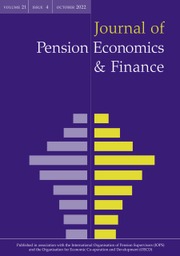Crossref Citations
This article has been cited by the following publications. This list is generated based on data provided by
Crossref.
Clark, Gordon L.
Marshall, John
and
Caerlewy-Smith, Emiko
2006.
Solutions to the Asset Allocation Problem by Informed Respondents: The Significance of the Size-of-Bet and the 1/N Heuristic.
SSRN Electronic Journal,
Monk, Ashby H. B.
2007.
The Knot of Contracts: The Corporate Geography of Legacy Costs.
SSRN Electronic Journal,
Clark, Gordon L
and
Knox‐Hayes, Janelle
2007.
Mapping UK pension benefits and the intended purchase of annuities in the aftermath of the 1990s stock market bubble.
Transactions of the Institute of British Geographers,
Vol. 32,
Issue. 4,
p.
539.
Monk, Ashby H. B.
2007.
The Geography of Pension Liabilities and Fund Governance in the United States.
SSRN Electronic Journal,
Clark, Gordon L.
and
Urwin, Roger
2007.
Best-Practice Investment Management: Lessons for Asset Owners from the Oxford-Watson Wyatt Project on Governance.
SSRN Electronic Journal,
Clark, Gordon L.
and
Monk, Ashby H. B.
2007.
Conceptualizing the Defined Benefit Pension Promise: Implications from a Survey of Expert Opinion.
SSRN Electronic Journal,
Clark, Gordon L
and
Urwin, Roger
2008.
Best-practice pension fund governance.
Journal of Asset Management,
Vol. 9,
Issue. 1,
p.
2.
CLARK, GORDON L.
and
STRAUSS, KENDRA
2008.
Individual pension-related risk propensities: the effects of socio-demographic characteristics and a spousal pension entitlement on risk attitudes.
Ageing and Society,
Vol. 28,
Issue. 6,
p.
847.
Clark, Gordon L.
and
Urwin, Roger
2008.
Leadership, Collective Decision-Making, and Pension Fund Governance.
SSRN Electronic Journal,
Hobohm, Daniel
2008.
Investors in Private Equity Funds: Large-Scale Performance Analysis and the Question if Location Matters.
SSRN Electronic Journal,
Monk, Ashby H. B.
2008.
The Knot of Contracts: The Corporate Geography of Legacy Costs.
Economic Geography,
Vol. 84,
Issue. 2,
p.
211.
Yermo, Juan
2008.
Pension Fund Governance: Challenges and Potential Solutions.
SSRN Electronic Journal,
Clark, Gordon L.
and
Knox-Hayes, Janelle
2008.
The 'New' Paternalism, Consultation and Consent: Expectations of UK Participants in Defined Contribution and Self-Directed Retirement Savings Schemes.
SSRN Electronic Journal,
Clark, Gordon L.
Knox-Hayes, Janelle
and
Strauss, Kendra
2008.
The Significance of Socio-Economic Status, Financial Sophistication, Salience and the Scale of Deliberation in UK Retirement Planning.
SSRN Electronic Journal,
Clark, Gordon L.
2008.
Governing Finance: Global Imperatives and the Challenge of Reconciling Community Representation with Expertise.
Economic Geography,
Vol. 84,
Issue. 3,
p.
281.
Strauss, Kendra
2009.
Cognition, Context, and Multimethod Approaches to Economic Decision Making.
Environment and Planning A: Economy and Space,
Vol. 41,
Issue. 2,
p.
302.
Clark, Gordon L
and
Knox-Hayes, Janelle
2009.
The ‘new’ paternalism, consultation and consent: Expectations of UK participants in defined contribution and self-directed retirement savings schemes.
Pensions: An International Journal,
Vol. 14,
Issue. 1,
p.
58.
Clark, Gordon L
Knox-Hayes, Janelle
and
Strauss, Kendra
2009.
Financial Sophistication, Salience, and the Scale of Deliberation in UK Retirement Planning.
Environment and Planning A: Economy and Space,
Vol. 41,
Issue. 10,
p.
2496.
Clark, Gordon L.
2009.
Temptation and the Virtues of Long-Term Commitment: The Governance of Sovereign Wealth Fund Investment.
SSRN Electronic Journal,
Monk, Ashby H. B.
2009.
Pension Buyouts: What Can We Learn from the UK Experience?.
SSRN Electronic Journal,


